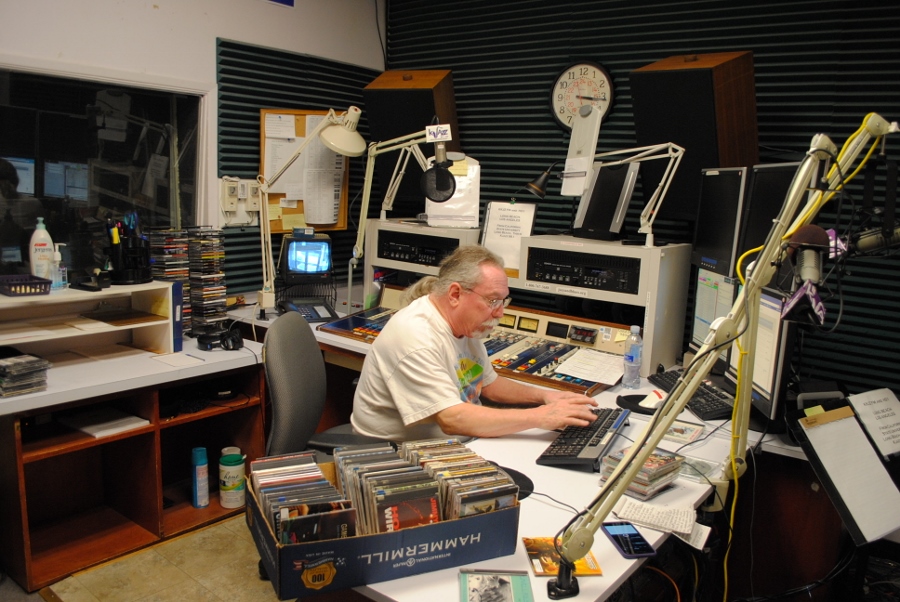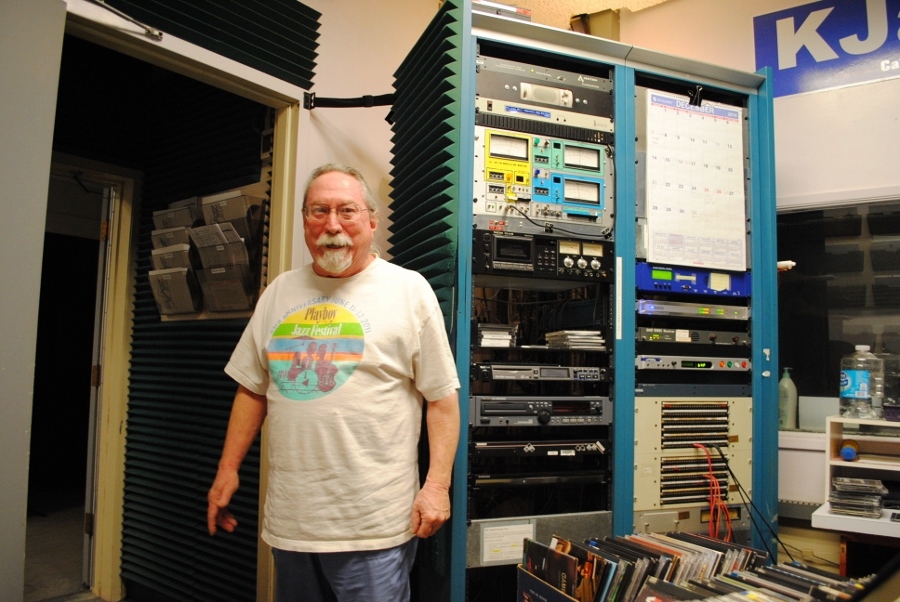
Photos by Asia Morris.
Gary “The Wagman” Wagner is anything but your typical radio host. In a corporate and modernized world where even the most renowned radio personalities arrive at the studio with a pre-planned playlist, or a playlist that is, more often than not, chosen for them ahead of time by someone else, The Wagman stands out as an iconic pioneer in a day and age where technology has rendered the radio broadcaster’s profession a safe space void of mistakes, spontaneity and genuine charismatic appeal.
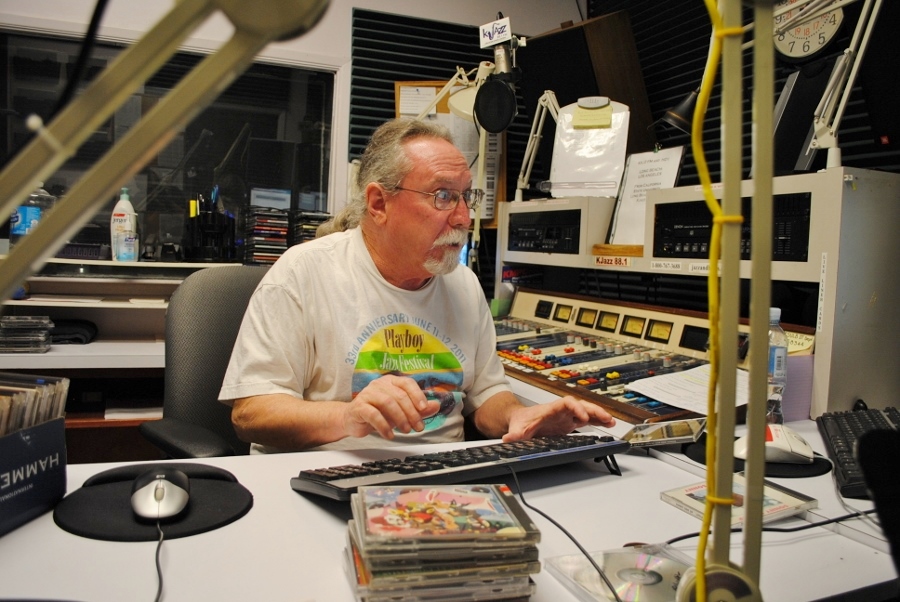 Wagner, who has been at KKJZ—more commonly known as KJazz—as the world-renowned and listened to “Nothin’ But the Blues” radio host for the past 23 years, as well as the Long Beach Blues Festival host from 1994 to 2000, has been chosen as one of two recipients of this year’s International Blues Foundation Keeping the Blues Alive Award (KBA), under the public radio category.
Wagner, who has been at KKJZ—more commonly known as KJazz—as the world-renowned and listened to “Nothin’ But the Blues” radio host for the past 23 years, as well as the Long Beach Blues Festival host from 1994 to 2000, has been chosen as one of two recipients of this year’s International Blues Foundation Keeping the Blues Alive Award (KBA), under the public radio category.
Nestled within one of CSULB’s oldest buildings, the KJazz studio has been the home of Wagner’s witty commentary and rousing blues playlists for over two decades.
“I have been blessed with a position in life that has a deep involvement with blues music, one that allows me to benefit blues musicians that I find worthy of benefit,” said Wagner. “My rule is, it has to be a win for both the artist and the listener. Therefore, I have determined that this is my purpose: to expose the greatness of known and unknown blues artists to those that want or need to hear this music.”
The International Blues Foundation presents the KBA Awards to individuals and organizations that have made significant contributions to blues music. The KBA ceremony will be held in conjunction with the 31st International Blues Challenge in Memphis, Tennessee, which begins January 20 and features the final rounds of the world’s largest and most prestigious blues music competition, as well as seminars, showcases, and receptions for blues societies, fans, and professionals. The KBAs are awarded by a select panel of blues professionals to those working actively to promote and document the music.
During a lifetime on the radio, Gary Wagner has met hundreds of legendary blues artists like Muddy Waters, B.B. King and Bobby “Blue” Bland. He was instrumental in helping several artists, including Keb’ Mo’ and Eric Sardinas, get their start. Wagner worked with dozens of the greats during his years hosting the Long Beach Blues Festival including Etta James, John Lee Hooker, Buddy Guy, Bo Diddly, Taj Majal, John Mayall, Little Milton, The Allman Brothers and many others.
“The KBA Committee always looks to honor longevity,” said KBA Committee Chairman Art Tipaldi in a statement. “This year’s slate of 15 recipients comes with over 400 years of dedicated service to spreading blues music. With so many dedicated organizations here and abroad, the committee decided to honor two blues society affiliates, one American and one international. The Blues Foundation is pleased to honor these people and organizations as a tribute to the years each has given to supporting blues music.”
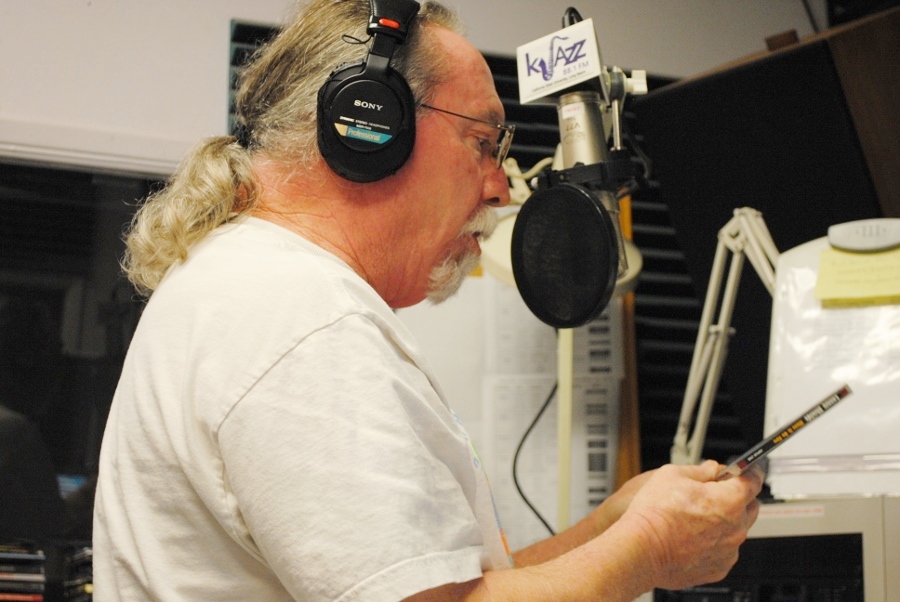 This is Gary Wagner’s story, a dedication to the radio man’s long history of trial and error, humor and accomplishment, and an ode to a man who facilitated the growth of a musical culture indigenous to America that is far too commercially ignored. This is a testament to the man with the voice who brought, and still brings, blues culture to Long Beach every weekend, and will likely and hopefully continue to for many years to come.
This is Gary Wagner’s story, a dedication to the radio man’s long history of trial and error, humor and accomplishment, and an ode to a man who facilitated the growth of a musical culture indigenous to America that is far too commercially ignored. This is a testament to the man with the voice who brought, and still brings, blues culture to Long Beach every weekend, and will likely and hopefully continue to for many years to come.
While Wagner’s interest in blues was a later fruition within the entirety of his career, he found thanks to the opinions of those around him that he had a voice for the profession. It all started when he was over at a friend’s house as a budding adolescent, before he developed the deep, recognizable voice he is known for today.
Wagner turned a knob on the console and chuckled, “We were out in the living room talking and his mom was back in the other room and she said, ‘Who’s out there?!’ She came on around, ‘Who’s out there?’ And it was just me. And she said, ‘Well it sounded like a man’s voice. You should be on the radio.’ Several people told me that so I thought, ‘Well, okay. I could be interested in that.’”
In high school, Wagner met a kid who had built his own radio transmitter and although it was illegal, the dynamic duo created their own radio station and broadcasted from the friend’s garage. The “station” didn’t have a landline, so the two used a walkie-talkie and a pay phone, a kind of innovative scrappiness only found in the truly passionate.
“We’d send one of the kids down to the phone booth at the gas station on the corner, we’d give out that number for our request line,” Wagner explained. “And so people would call and make a request and they’d take the walkie-talkie and give it back to the studio and then they could play it. Then the FCC found out about that and they weren’t all that pleased… And neither were this kid’s parents when the FCC arrived to arrest us.”
While the two finagled their way out of an arrest by giving up the transmitter, they were not to be stopped. With a big speaker and an amplifier they moved their home-grown operation to the roof and partook in what they called audiocasting. The station involved the whole neighborhood, hosted contests and gave away 45s and other prizes.
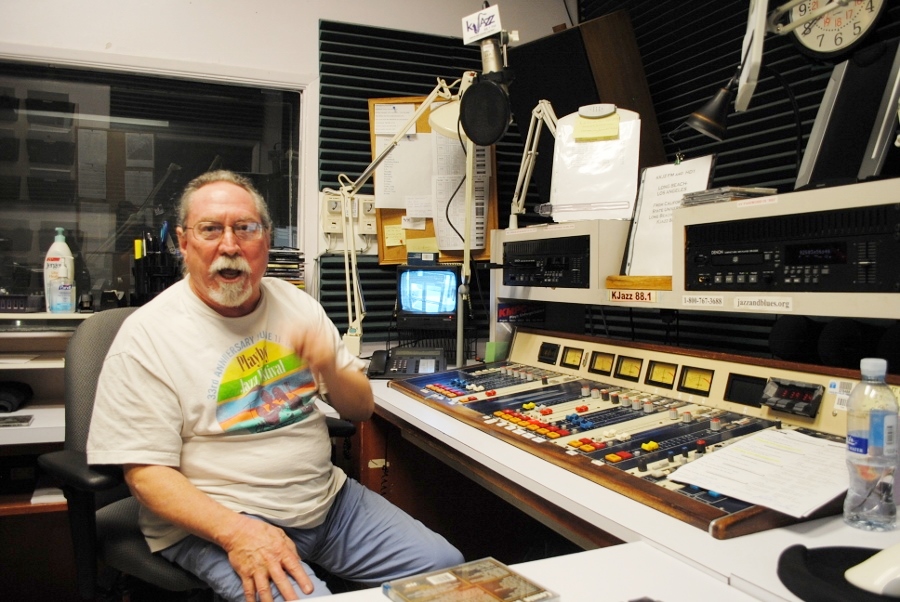 “…but the parents in the neighborhood weren’t really fond of that process, so they put a kibosh on that,” Wagner said with a smirk.
“…but the parents in the neighborhood weren’t really fond of that process, so they put a kibosh on that,” Wagner said with a smirk.
It wasn’t until 1979, when Wagner was working a five-year stint for WJKL in Elgin, Illinois, a progressive rock station at the time, that he was given the opportunity to interview Muddy Waters.
“He was very impressive, he was a very impressive guy,” said Wagner. “He was large in stature and when he walked into the room he was in charge of the room. You could tell, it was obvious. And I thought that was pretty impressive. I’d never met anybody like that before, because I was a rock n’ roll guy at the time. I wasn’t necessarily as into the blues as I am now, I was playin’ rock n’ roll on the radio back in Chicago. And he really left a profound impression on me.”
The interview planted the seed for his future blues broadcasting career. However, when he moved back to Southern California, it wasn’t until after he had dabbled in several other, less fulfilling options that he began to consider radio hosting the genre in 1991. Real estate, massage, learning how to fix computers and graphic design were the paths he flirted with, while Wagner’s break from the real estate business mimicked that profound life lesson taught and heard time and time again, yet can only be learned from the misery of actually experiencing it.
“I made a lot of money and I had a lot of fun spending it and then I realized that money is not going to make you happy, you gotta do what makes you happy,” he shrugged at the simplicity. “So I decided not to do real estate anymore.”
“And then KJazz came to me,” he continued. “At the time it was KLON, it was back in ’91, and they asked me if I wanted to do the blues show. The guy that was doing the Blues show had left and I said, ‘Nah, I don’t think so.'”
It took some convincing on KLON’s part, but Wagner finally agreed to make a tape, even though he felt like he didn’t know the music that well. The station offered to send in a couple people to help him choose the tracks, an offer that soon wore thin on Wagner’s quickly developing style.
He said, “After a couple months of that I kicked those other two guys outta there because I didn’t like the music they were picking.”
KLON found somebody else to run the show, a broadcaster from Boise, Idaho who ended up lasting a short nine months. The station approached Wagner once again who, by that time, had warmed up to the idea of taking a more permanent position.
“By that time I was into it,” he said. “I wanted to keep doing it when he took over. They said, ‘Well, we think you’re doing a good job, but we’d like to get somebody that has a personality.’ Well, thanks for the pat on the back!”
Wagner came back after the Boise broadcaster left, but with one stipulation, “Yea, I’ll do it again if you make it permanent.” The rest is history, but not one without its trials and tribulations. Wagner stayed with KLON until 2001, when he resigned over a dispute with management about fundraising practices. When the station, now KJazz, was bought by Global Jazz in 2009, he was asked to return and did so enthusiastically. However, in 2012 Global Jazz attempted to cut his hours in an attempt to make it fair for the other hosts, according to Wagner, and never heard the end of it. When you talk about overcoming adversity, Wagner and Nothin’ But the Blues fans know a thing or two about fighting for what they love.
Wagner explained, “So everybody said, well, ‘I’m going to tell ’em if they don’t give you those hours back I’m never going to give them any money ever again.’ And I said, ‘Well, that’s probably not going to do it.’ Because I’d rather take the high road and say, I’m just doing the best I can, I’m happy to have a job and I’m disappointed that they took those hours away. I said, ‘If you want to influence the situation you could send them a letter.’ That’s better than an email, that’s better than a phone call, because they actually have to deal with it, physically. And apparently they started getting two extra bags of mail every day.” Wagner received all but one of his hours back.
One of the things that distinguishes The Wagman from other radio personalities is his insistence on choosing his own music. He works out of a box full of compact discs and uses his talented ear, not a computer or background employee, to choose as he goes, to think on his feet in real time.
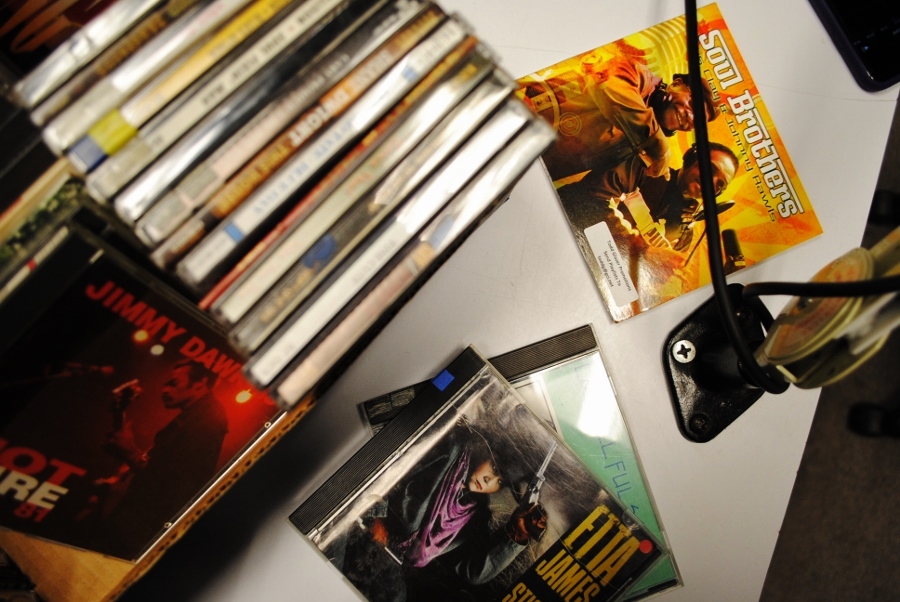 Wagner placed a pair of headphones over his ears and leaned into the microphone, “I think there’s somebody maybe, doing a little sippin’ out in the audience today because somebody called and said ‘Will you please do “One Bourbon, One Scotch and One Beer” and I guess that’s what they were havin’ so… Well they probably won’t make it all the way ’till six o’clock, but I’m here till six o’clock playin’ Nothin’ But the Blues. I’m The Wagman, Gary Wagner.”
Wagner placed a pair of headphones over his ears and leaned into the microphone, “I think there’s somebody maybe, doing a little sippin’ out in the audience today because somebody called and said ‘Will you please do “One Bourbon, One Scotch and One Beer” and I guess that’s what they were havin’ so… Well they probably won’t make it all the way ’till six o’clock, but I’m here till six o’clock playin’ Nothin’ But the Blues. I’m The Wagman, Gary Wagner.”
“Since I’m able to [choose my own music] I’m able to play whatever I feel, at the moment I’m doin’ it,” said Wagner. “Instead of somebody in some high-rise building in Dallas or someplace making up what’s going to happen on my show. I just pick ’em as I go, and that puts the pressure on. To me, that’s why I do it. I’m an adrenaline junkie, and when the pressure’s on, the adrenaline flows, and by the time I get off the air I’m like, petered out, I can’t even eat for a couple hours. Most people, even if they get to pick their music they come in with a playlist, now that’s no fun.”
“It’s more spontaneous that way,” he continued. “I think it creates a better opportunity to communicate because if it’s raining outside I can play a song about rain, but if you have to follow a playlist you can’t do that. If I’m in a bad mood I can play songs about bein’ in a bad mood. Or, if I’m in a good mood, for that matter.
The signature Wagner style is all about transitions. It’s not about the songs you play, he says, it’s about how you put them together. “That’s where live,” he said, “is in that transition from one song to another. I try to make that somehow a pleasant experience. That’s just how I learned to do it.”
The Wagman served as the host and emcee for the Long Beach Blues Festival from 1994 to 2000. He worked with the Allman Brothers Band, Etta James, Buddy Guy, Chuck Barry, John Lee Hooker among other talented singers and musicians. The stories he carries from working with the greats are a novel unto themselves, while a few should be kept in a private journal. Buddy Guy always had to have a bottle of cognac delivered to his dressing room, Chuck Berry would show up and completely avoid talking to any of his fans and Etta James’ left Wagner simply speechless with her abundant talent.
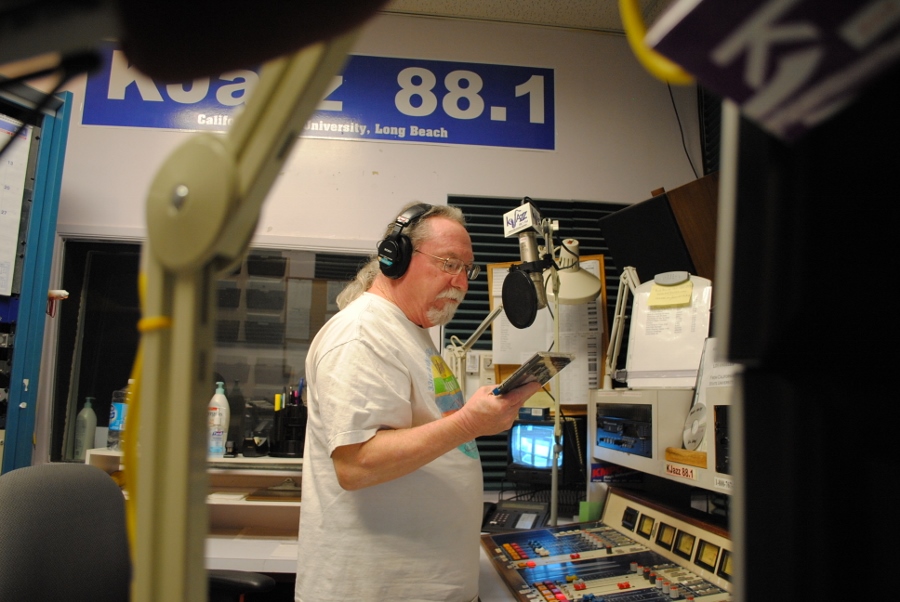 In describing Berry, Wagner said, “He came all by himself, in his car, it was a Ford Galaxy or whatever, and he pulled in backstage and the producer came up and they talked a little minute and the producer gave him a suitcase full of money, which they put into the truck of the car. Then he sat in the car with the windows rolled up, wouldn’t talk to anybody until it was time for him to go on stage, then he went up. He went onstage, soon as he was done he went to go back into his car and drove off. Didn’t talk to anybody, didn’t sign anything for anybody, nothin’.”
In describing Berry, Wagner said, “He came all by himself, in his car, it was a Ford Galaxy or whatever, and he pulled in backstage and the producer came up and they talked a little minute and the producer gave him a suitcase full of money, which they put into the truck of the car. Then he sat in the car with the windows rolled up, wouldn’t talk to anybody until it was time for him to go on stage, then he went up. He went onstage, soon as he was done he went to go back into his car and drove off. Didn’t talk to anybody, didn’t sign anything for anybody, nothin’.”
While the Long Beach Blues Festival, created originally as a fundraiser for KLON, grew to attract tens of thousands of attendees, the organizers had to put an end to it due to funding issues, said Wagner.
And forever an advocate of known and unknown blues artists, Wagner of course, has a sound opinion about the blues on public radio.
“It’s sad that blues is not considered a radio format by corporate America,” he said. “I mean you got your soft jazz, smooth jazz they call it, classic rock, around here you have a lot Hispanic programming, but no blues on commercial radio. And it doesn’t mean that it’s not commercially viable it just means that the corporations that control it don’t have the guts to put it out there. And it’s American music. It’s indigenous to this country and people elsewhere in the world think it ought to be a radio format, but not here. I think that ought to be changed.”
“The Keepin’ the Blues Alive Award, that’s a big honor for me,” he continued. “It’s like a lifetime achievement award. I’ve been doing this now for 23 years, pretty much continuously, and that’s just the blues part because I’ve been doing radio for a lot longer than that. But, it’s good to get some recognition like that. Maybe I’m doing alright.”
You can tune into Gary Wagner’s musings and selective blues choosings on Nothin’ But the Blues at 88.1FM on Saturdays from 2:00PM to 6:00PM and Sundays from 2:00PM to 7:00PM. You can submit song requests on the Facebook page here or by calling (562) 985-2970 or emailing gwagner@kkjz.org. Wagner’s show also streams live every weekend online here.
The Blues Foundation is Memphis-based, but world-renowned as the organization dedicated to preserving our blues music history, celebrating recording and performance excellence, supporting blues education, and ensuring the future of this uniquely American art form. Founded in 1980, The Blues Foundation has 4,000 individual members and 200 affiliated local blues societies representing another 50,000 fans and professionals around the world. Its signature honors and events – the Blues Music Awards, Blues Hall of Fame, International Blues Challenge, and Keeping the Blues Alive Awards – make it the international center of blues music.
Tickets and more information about about the KBA ceremony are available online here or by calling 901-527-2583.
